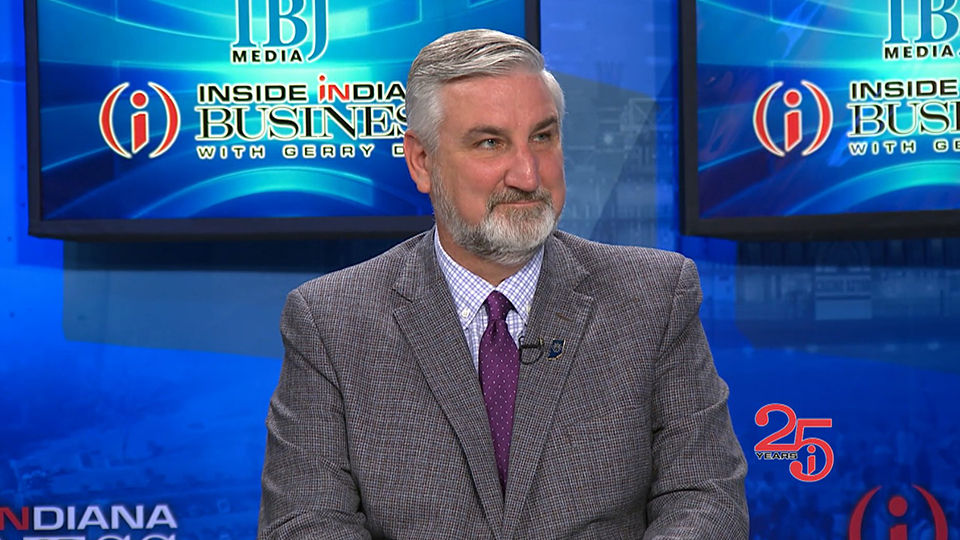Governor signs Indy tax district, foreign land ownership bills
Subscriber Benefit
As a subscriber you can listen to articles at work, in the car, or while you work out. Subscribe Now
Gov. Eric Holcomb signed three bills Friday, including one that shifts the requirements for Indianapolis’ downtown economic enhancement district.
Indianapolis established a downtown tax district in a council vote late last year. The district would raise funds for the operating costs of a low-barrier shelter, planned near the 1000 block of East Georgia Street in Fountain Square. It would also fund cleanliness and beautification efforts in Mile Square.
House Enrolled Act 1199, now Indiana law, adds new limits and requirements to the framework initially created by the Legislature in 2023. It shifts the membership of the board governing the district to become majority state-appointed and exempts all residential property types from paying the fees, unless they choose to opt-in.
Before the changes, the proposal from the Indy Chamber and Downtown Indy Inc. included all property types with no exemptions.
The initial plan called for the downtown economic enhancement district initially to encompass the Mile Square. In those boundaries, single-family homeowners would have been required to pay an annual $250 flat fee starting in 2025, while owners of commercial properties would have been expected to pay nearly 0.17% of their properties’ gross assessed value, or about $1,681 per $1 million in gross assessed value.
The changes would allow Indianapolis to expand the size of the district beyond just the Mile Square to a total of 2 square miles. However, the legislation requires the boundaries to be equal on all sides.
It also caps the funds raised from the district at $5.5 million and makes the district framework expire after 10 years with no renewal option.
Under the original ordinance, the Indianapolis mayor had two appointments and the governor had one on an eight-member board. Under the changes, the mayor will have one appointment and the governor will have four appointments to a nine-member board. Two members will be appointed by the City-County Council. The other two will consist of one member of the state Senate appointed by the president pro-tem and one member of the House appointed by the speaker.
Proposals will require six affirmative votes to pass. The amended bill also requires a majority of the board members to be property owners within the district.
The legislation introduced in January by Rep. Julie McGuire, R-Indianapolis, aimed to abolish the district completely. Sen. Scott Baldwin, R-Noblesville, brought forth the changes in a committee amendment. The move followed several weeks of discussion between lawmakers and groups including the city of Indianapolis, Downtown Indy Inc. and the Indy Chamber, he said at the time.
The initial legislation would have taken back a funding mechanism created for downtown Indianapolis by legislators last year.
Holcomb’s office played a role in establishing the framework in the final hours of the 2023 legislative session. State leaders wanted to find a way for Indianapolis to pay for the operating costs of a proposed low-barrier homeless shelter, which a state program will likely award millions in grants.
The former version of Indianapolis’ economic enhancement district is voided under the new law, meaning the Indianapolis City-County Council and other stakeholders will have to restart the implementation process for a new district that complies with the state legislation.
Another bill signed by Holcomb Friday voids a nearly 25-year long lawsuit between the city of Gary and gun manufacturers. The new state law will prohibit localities from seeking legal action against gunmakers, instead only allowing the state attorney general to sue. The law is written to be retroactive, taking effect just days prior to the beginning of the 1999 Gary lawsuit.
Holcomb also signed House Enrolled Act 1183, which prohibits U.S. adversaries, including China, Iran, North Korea and Russia, from owning or leasing Hoosier farmland. It would prohibit purchasing by both citizens and business entities with ties to adversaries.
It also prohibits those groups from purchasing, leasing or acquiring land within 10 miles of a military installation. The Indiana attorney general could take legal action if the law is violated.
The law will take effect July 1.
Just two bills remain unsigned. One limits the power of the state’s public access counselor, and the other defines antisemitism. If the governor chooses not to sign or veto the bills, they will become law automatically after March 19.
